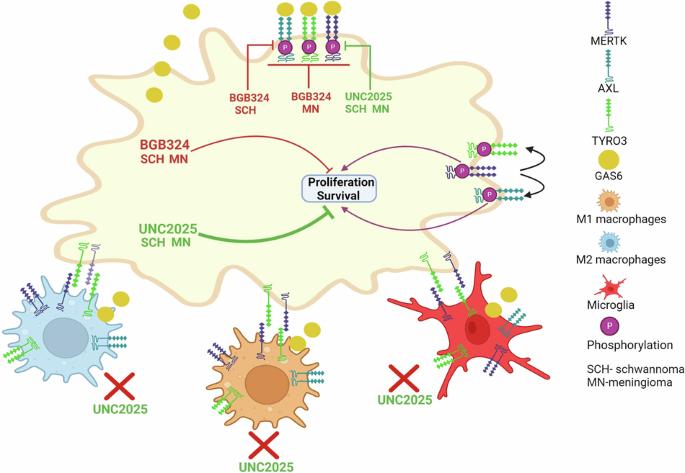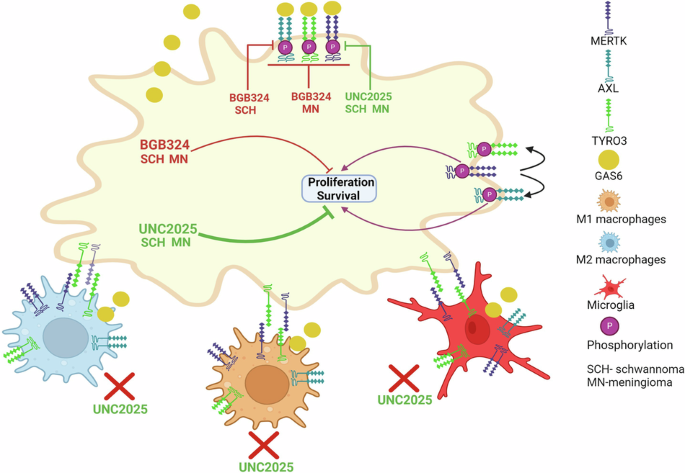Targeting MERTK on tumour cells and macrophages: a potential intervention for sporadic and NF2-related meningioma and schwannoma tumours
IF 6.9
1区 医学
Q1 BIOCHEMISTRY & MOLECULAR BIOLOGY
引用次数: 0
Abstract
Meningioma and schwannoma are common tumours of the nervous system. They occur sporadically or as part of the hereditary NF2-related schwannomatosis syndrome. There is an unmet need for new effective drug treatments for both tumour types. In this paper, we demonstrate overexpression/activation of TAM (TYRO3/AXL/MERTK) receptors (TAMs) and overexpression/release of ligand GAS6 in patient-derived meningioma tumour cells and tissue. For the first time, we reveal the formation of MERTK/TYRO3 heterocomplexes in meningioma and schwannoma tissue. We demonstrate the dependence of AXL and TYRO3 expression on MERTK in both tumour types, as well as interdependency of MERTK and AXL expression in meningioma. We show that MERTK and AXL contribute to increased proliferation and survival of meningioma and schwannoma cells, which we inhibited in vitro using the MERTK/FLT3 inhibitor UNC2025 and the AXL inhibitor BGB324. UNC2025 was effective in both tumour types with superior efficacy over BGB324. Finally, we found that TAMs are expressed by tumour-associated macrophages in meningioma and schwannoma tumours and that UNC2025 strongly depleted macrophages in both tumour types.


以肿瘤细胞和巨噬细胞上的 MERTK 为靶点:对散发性和 NF2 相关脑膜瘤和裂隙瘤的潜在干预。
脑膜瘤和分裂瘤是神经系统的常见肿瘤。它们既可偶发,也可作为遗传性 NF2 相关分裂瘤病综合征的一部分发生。这两种肿瘤类型都需要新的有效药物治疗。在本文中,我们证明了患者来源的脑膜瘤肿瘤细胞和组织中 TAM(TYRO3/AXL/MERTK)受体(TAMs)的过表达/激活以及配体 GAS6 的过表达/释放。我们首次揭示了脑膜瘤和裂隙瘤组织中 MERTK/TYRO3 异质复合物的形成。我们证明了这两种肿瘤类型中 AXL 和 TYRO3 的表达依赖于 MERTK,以及脑膜瘤中 MERTK 和 AXL 表达的相互依赖性。我们使用 MERTK/FLT3 抑制剂 UNC2025 和 AXL 抑制剂 BGB324 在体外抑制了这两种抑制剂。UNC2025 对这两种肿瘤类型都有效,而且疗效优于 BGB324。最后,我们发现脑膜瘤和裂隙瘤中的肿瘤相关巨噬细胞表达 TAMs,UNC2025 能强效清除这两种肿瘤中的巨噬细胞。
本文章由计算机程序翻译,如有差异,请以英文原文为准。
求助全文
约1分钟内获得全文
求助全文
来源期刊

Oncogene
医学-生化与分子生物学
CiteScore
15.30
自引率
1.20%
发文量
404
审稿时长
1 months
期刊介绍:
Oncogene is dedicated to advancing our understanding of cancer processes through the publication of exceptional research. The journal seeks to disseminate work that challenges conventional theories and contributes to establishing new paradigms in the etio-pathogenesis, diagnosis, treatment, or prevention of cancers. Emphasis is placed on research shedding light on processes driving metastatic spread and providing crucial insights into cancer biology beyond existing knowledge.
Areas covered include the cellular and molecular biology of cancer, resistance to cancer therapies, and the development of improved approaches to enhance survival. Oncogene spans the spectrum of cancer biology, from fundamental and theoretical work to translational, applied, and clinical research, including early and late Phase clinical trials, particularly those with biologic and translational endpoints.
 求助内容:
求助内容: 应助结果提醒方式:
应助结果提醒方式:


